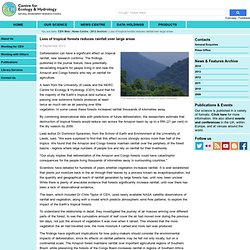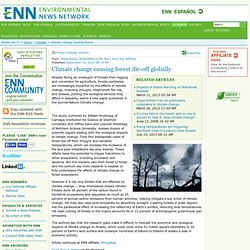

Air pollution still at dangerous levels in Europe, report finds. Amount of coldest Antarctic water near ocean floor decreasing for decades. March 20, 2012 A layer of Antarctic Bottom Water colder than 0ºC (colors, with darkest blue areas having the thickest layer, and white none) covers the ocean floor around Antarctica (center, shaded grey).

Rates at which this layer is thinning during the study period (red numbers in meters per decade) are shown for for each deep basin (outlined by thin grey lines). These rates are estimated using data from repeated oceanographic expeditions (ship tracks shown by thick black lines). Note that seawater at the ocean surface stays liquid even at temperatures approaching -2ºC because of its high salt content. Download here (Credit: NOAA) Scientists have found a large reduction in the amount of the coldest deep ocean water, called Antarctic Bottom Water, all around the Southern Ocean using data collected from 1980 to 2011.
Record Arctic Sea Ice Melt to Levels Unseen in Millennia. Posted on 5 September 2012 by dana1981 The record Arctic sea ice decline this year has predictably and deservedly received a fair amonut of media attention.

Jonathan Leake of the Sunday Times recently penned an article on the impending sea ice record. The bulk of the article was quite good, but at the end succumbed to the standard mainstream media practice of seeking "balance," thus including some comments by John Christy. Christy has become very reliable for arguing that anything and everything related to climate change probably just boils down to natural variability, as he recently told US Congress was the case with regards to the frequency of extreme weather events, contrary to the body of peer-reviewed scientific literature.
As we will see in this post, Christy once again misrepresented the body of scientific literature with regards to Arctic sea ice extent in his efforts to paint the Arctic sea ice death spiral as nothing out of the ordinary. 2012 vs. 1940. Loss of tropical forests reduces rainfall over large areas. 6 September 2012 The Atlantic forest of Brazil © John Willsher Deforestation can have a significant effect on tropical rainfall, new research confirms.

The findings, published in the journal Nature, have potentially devastating impacts for people living in and near the Amazon and Congo forests who rely on rainfall for agriculture. A team from the University of Leeds and the NERC Centre for Ecology & Hydrology (CEH) found that for the majority of the Earth’s tropical land surface, air passing over extensive forests produces at least twice as much rain as air passing over little vegetation. In some cases these forests increased rainfall thousands of kilometres away. By combining observational data with predictions of future deforestation, the researchers estimate that destruction of tropical forests would reduce rain across the Amazon basin by up to a fifth (21 per cent) in the dry season by 2050.
Scientists have debated for hundreds of years whether vegetation increases rainfall. Climate change causing forest die-off globally. Already facing an onslaught of threats from logging and conversion for agriculture, forests worldwide are increasingly impacted by the effects of climate change, including drought, heightened fire risk, and disease, putting the ecological services they afford in jeopardy, warns a new paper published in the journal Nature Climate Change.

The study, authored by William Anderegg of Carnegie Institution for Science at Stanford University and Jeffrey Kane and Leander Anderegg of Northern Arizona University, reviews dozens of scientific papers dealing with the ecological impacts of climate change. They find widespread cases of forest die-off from drought and elevated temperatures, which can increase the incidence of fire and pest infestations like pine beetles. These effects have the potential to trigger transitions to other ecosystems, including scrubland and savanna.
However it is not only forests that are affected by climate change — they themselves impact climate. Weather 'cost rural Britain £1bn' 9 September 2012Last updated at 18:06 ET By Tom Heap BBC Countryfile The ice cream business has been hit hard This year's dreadful weather has cost rural Britain at least £1bn, according to an investigation by BBC One's Countryfile.

Data from farmers, tourist businesses, insurers and events organisers show the wettest summer for 100 years has hit the countryside hard. Factors include reduced visitor numbers at countryside attractions such as stately homes and camp sites. Meanwhile, some country events were cancelled due to bad weather. In pictures: 100 most threatened species. Cave bacteria could help develop future antibiotics. 9 September 2012Last updated at 19:51 ET Bacteria found in caves could provide the clues to help produce antibiotics needed in the fight against drug-resistant superbugs, explains Prof Hazel Barton.

When you think about caves, your first thoughts might not include microbes and antibiotics, but these isolated and starved environments may hold the key to better understanding our long battle with drug resistant bacteria. Antibiotics are chemical keys, constructed to fit the molecular locks necessary to kill bacteria. They mimic cellular patterns to block, bind and even collapse critical structures within the cell. As a result, the bacterium is unable to function, falls apart, or dies. Chemically, antibiotics are much more complex than anti-cancer or anti-viral drugs, looking more like a spider's web with their intricate patterns of chemical bonds.
Pesticide that kills bees ‘must be banned’ - Nature - Environment. Trees, grass and gas: the battle for dominance.